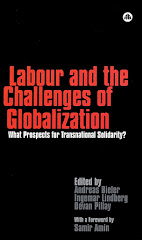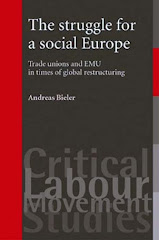China’s developmental strategy has been
based on cheap labour, foreign direct investment (FDI) and the assembling of
pre-fabricated parts for export to North American and European markets. This
export-oriented growth strategy in low value added production sectors has,
however, come under pressure as a result of the global economic crisis and a
decline in global demand. In his presentation at Nottingham University on 17
February, jointly hosted by the School of Contemporary
Chinese Studies and the Centre for the Study of
Social and Global Justice, Florian Butollo from Jena University in Germany
investigated whether China’s attempts at industrial upgrading in response to
the crisis have also resulted in ‘social upgrading’ for its workforce.
Wednesday 18 February 2015
Monday 2 February 2015
The Great Pension Robbery – UCU unravelling!
Only three years after closing the final salary pension scheme of USS for new members of staff in pre-1992 Higher Education (HE) institutions in the UK, the employers returned to the table with new demands. This time they asked for cuts to staff members’ pensions of around 27 per cent. Initially, the University and College Union (UCU) responded forcefully and carried out a ballot for industrial action: 78% of union members who participated voted for strike action and 87% voted for action short of a strike. The turnout of 45% was the highest in a national higher education ballot since UCU was formed in 2006. And yet, in January 2015 UCU settled for a negotiated deal, which was only marginally better for members than the initial proposals by the employers. Instead of 27 per cent of cuts, many members will now face cuts of somewhere between 20 and 24 per cent. How could this happen? In this blog post, I will provide a critical assessment of this struggle, drawing also on my own experience as a member of the Higher Education Committee (HEC), where the crucial decisions were taken within UCU.
Subscribe to:
Posts (Atom)













